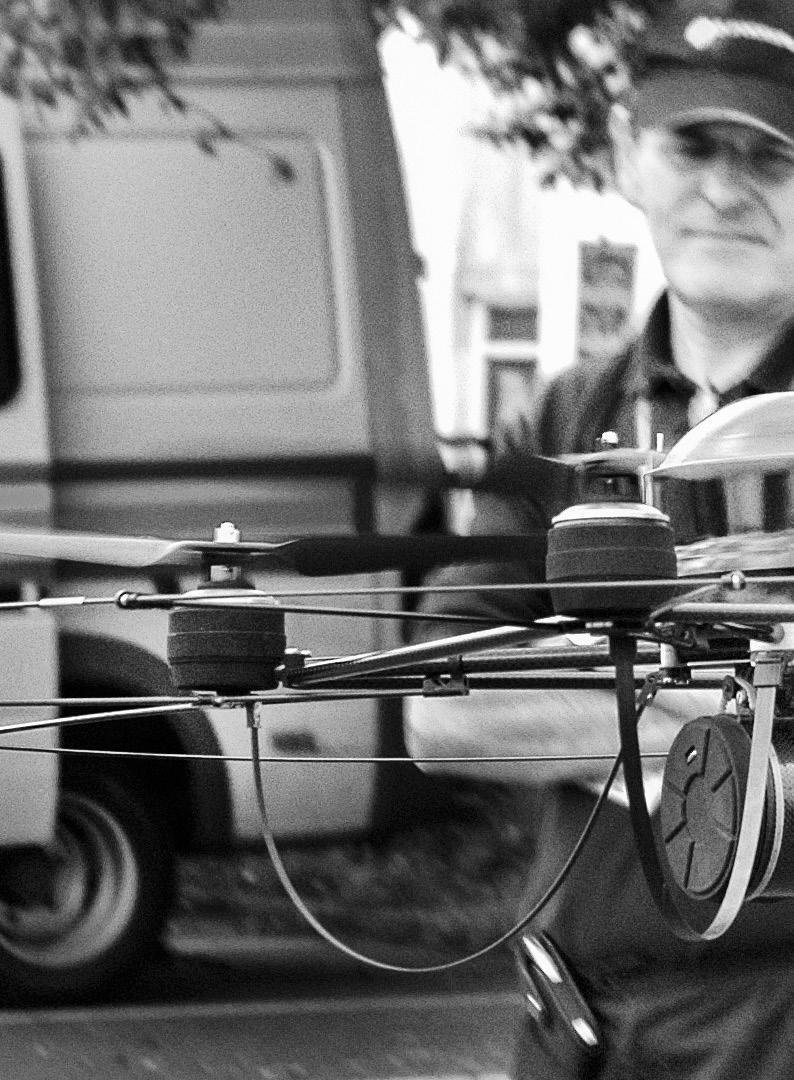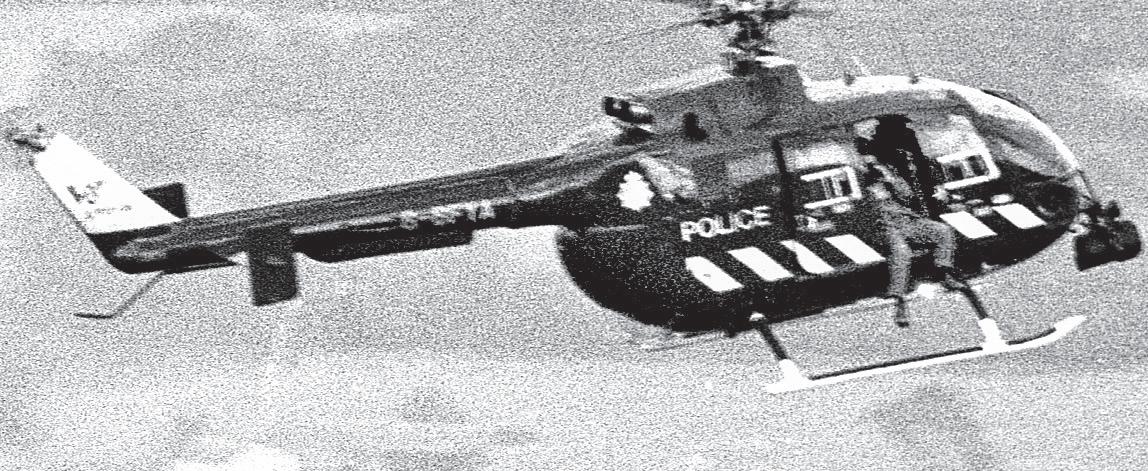
10 minute read
It continues
“There’s no need for the police and MI5 to break in - I’m not ashamed of anything I do. Tell ‘em to knock on the door ….. I’ll get the kettle on”.33
It continues …
Advertisement
Police surveillance really went up a gear to enable officers to deal with the subjects targeted under the Public Order Act 1986 and the Criminal Justice and Public Order Act 1994. This was just at the point of developments in modern computing, databases, the internet and improvements in video / digital camera technologies. Of course, they haven’t finished yet!
Now, under the Conservative government, chapter 3 of these developments are coming down the pipe. Priti Patel, the Home Secretary has yet further ambitions with the law dealing with the more recent concept of ‘aggravated trespass’. This of course, is dealing with access to land. It is a common denominator that would affect festivals, travellers, environmental protest, trade dispute and even a rambler having a walk in the countryside. Surveillance in the operational policing of these matters will be greatly enhanced.
“I would like to test the appetite to go further than the original proposals. I would like to broaden the existing categories of criminal trespass to cover trespassers on land who are there with the purpose of residing in their vehicle for any period and to give the police the relevant powers to arrest offenders in situ and to seize any vehicles or other property on unauthorised encampments promptly”.34
We are just at the cusp of a more widespread introduction of facial recognition systems. “Cameras are focused on an area; when people pass through the area their images are streamed directly to the live facial recognition system. This system contains a ‘watch-list’: a list of offenders wanted by the police or the courts”.35 Derived from all the methods and operations previously described. These techniques are currently the subject of much controversy and legal argument in the courts. 29





Derbyshire Constabulary and National Police Air Service officers testing drone use ...







“Call to Action .... In every sphere of policing a balance must be struck which respects local control whilst realising efficiency and effectiveness through appropriate national intervention. While the balance varies between policing functions, the need for smart investment in digital, data technology is strong and growing. If we believe in a National Digital Strategy and recognise it as something that will continue to evolve, we must create the capability that will allow it to happen”.36
Not all surveillance uses cameras of course. Undercover operations by police have legitimately targeted terrorist and very heavy organised criminals. Frequently the only way of bringing sufficient evidence to court. However, since the 1970’s policing units like the Special Demonstration Squad DSD and National Public Order Intelligence Unit NPOIU have operated undercover in a wide variety [more than 1000] of left wing, anarchist, trade union and social justice groups and campaigns.37

Since the exposure in 2010 of Mark Kennedy 38 as a long-term police infiltrator in activist groups in the UK and abroad, more than a dozen similar cases have been uncovered, with still others to come. For over forty years, the police secretly placed more than one hundred long-term undercover officers into scores of political groups in order to spy on them and subvert their work. In addition, a number of distasteful hidden police practices have been revealed, including stealing the identities of dead children, and tricking targets into intimate or even sexual relationships with agents – in some cases leading to the birth of children who were subsequently abandoned. Officers also testified in court under their false names; withheld evidence and actively planned and participated in serious crimes.
The police ask is the Public Order Act 1986 out-dated? it has been amended several times (mainly with the effect of strengthening police powers), but the fundamental framework it provides for the

policing of protests has essentially stayed the same since the mid-1980s. Recently, senior police officers have questioned whether the Act is still providing them with strong enough powers. Following the Extinction Rebellion (XR) protests in April 2019 senior officers from the Metropolitan Police questioned whether the Act should be reviewed.39
Metropolitan Police Commander Adrian Usher: “We will conduct a sober review of our tactics against recent protests, which is likely to say that the legislation associated with policing protest is quite dated, that policing and protest has moved on and that legislation should follow suit”.40

A police statement issued during the protests explained why they were unable to use some tactics involving force: “We have been asked why we are not using tactics such as containment - physically and forcibly stopping the protesters from moving around. The simple answer is we have no legal basis to do so. These are peaceful protesters; while disruptive their actions are not violent towards police, themselves or other members of the public. We are looking at other tactics such as tighter police cordons, but again that is resource intensive in terms of officer numbers and more often than not it just shifts the protesters to another location nearby, and does not assist in reopening roads”.41
“Home secretary Priti Patel is understood to want to take a fresh look at how the group is classified under the law after activists targeted print works and prevented several leading UK newspapers reaching the stands on Saturday. One option under consideration could see Extinction Rebellion classified as an organised crime group, according to reports – leaving organisers at risk of jail sentences of up to five years”.42 “The suggestion Extinction Rebellion should be reclassified as an ‘organised crime group’ is ridiculous,” the group responded.
Thus unleashing resource that might more accurately be targeted on folks more akin to modern-day versions of Al Capone!
In conclusion, I offer a little background on why we have been under surveillance as much as we have been. It is perhaps beyond the scope of this publication ……. So, please visit these links for further information.43 44
Please: don’t let the bastards grind you down.
Alan Lodge (Tash) - Photographer (October 2020)
References + Notes

1 2 3 4 5 6 7 8 9 10 11 12 13 14 15 16 17 18 19 20 21 22 23 24 25
26 27 28 29 30 31 32 33 34 35 36 37 38 39 40 41 42
43 44
Joseph Heller, Catch-22 ACPO (1983) Public Order Tactical Operations Manual. partially reproduced in Northam, Gerry (1988) Shooting in the Dark. London: Faber and Faber Benn, Tony (Chesterfield) Hansard. 22 July 1985 https://hansard.parliament.uk/Commons/1985-07-22/debates/e46c5d7c-0df2-49f7-a3d3-3c9fe7cfcb38/PoliceTrainingManual News: Wiltshire Operation Solstice, Police Review. 8 June 1985 Intelligence Services Act 1994 https://www.legislation.gov.uk/ukpga/1994/13/section/1/enacted Wadham, John. Legislation. Notes on The Intelligence Services Act 1994 https://onlinelibrary.wiley.com/doi/pdf/10.1111/j.1468-2230.1994.tb01983.x Security Service Act 1996 https://www.legislation.gov.uk/ukpga/1996/35/enacted Section 263, Investigatory Powers Act 2016 https://www.legislation.gov.uk/ukpga/2016/25/section/263/enacted National Criminal intelligence Service https://en.wikipedia.org/wiki/National_Criminal_Intelligence_Service Barnett, H. Jago, R. - Constitutional & Administrative Law Taylor & Francis, Jul 2011 Red Pepper. Issue 24. May 1996 Lodge, A. Stonehenge: ‘Battle of the Beanfield’ June 1985 http://alanlodge.uk/OnTheRoad/battle-of-the-beanfield ITN News 1st June 85 Operation Solstice - The Battle of the Beanfield [at 29.45mins] https://youtu.be/V1doyDQDZtc Operation Solstice - The Battle of the Beanfield [at 46.20mins] https://youtu.be/V1doyDQDZtc Section 39. Public Order Act 1986. http://www.legislation.gov.uk/ukpga/1986/64/section/39/enacted Campbell, Duncan “Photographer sues over police lies”. Guardian. 30 December 1993 British Journal of Photography “Festival photographer sues county police”. 6 January 1994 Campbell, Duncan “Police settle photographer’s claim over drug falsehood”. Guardian. 2 September 1998 Prestage, Michael. Police keep tabs on the travellers. Independent. 16 May 1993 https://www.independent.co.uk/news/uk/police-keep-tabs-on-the-travellers-2323342.html Southern Central Intelligence Unit: Minutes of meeting held on Tuesday 30th March 1993 at Police Headquarters, Devizes Campbell, Duncan. “Police track travellers by computer”. Guardian. 25 Feb 1994 Campbell, Duncan. “Police log travellers for crackdown”. Guardian. 25 Feb 1994 O’Conner, S & Lodge, A. “Watch with big brother”, Squall No 15. Summer 1997 https://squallmagazine.com/f/f15-28-watch-with-big-brother.html Murdoch, Angus. “The Impact of the Criminal Justice and Public Order Act 1994 on Britain’s Travellers”. PhD Thesis. Dept of Social Science 1998. University of Bristol https://research-information.bristol.ac.uk/files/34490939/300705.pdf Policing Atmospheres: Crowds, Protest and ‘Atmotechnics’ Dr Illan rua Wall, Associate Professor, School of Law, University of Warwick http://wrap.warwick.ac.uk/110495/7/WRAP-Policing-Atmospheres-Crowd-Protest-Atmotechnics-Wall-2018.pdf Police Review 21 March 1997 National Public Order Intelligence Unit NPOIU Formation – Files Overview http://specialbranchfiles.uk/npoiu-formation Bennetto, Jason. ‘Police unit to target green protesters’. Independent. 7 November 1998 https://www.independent.co.uk/news/police-unit-to-target-green-protesters-1183182.html Bunyan, Tony. ‘Watching us, via Europe’s back door’. Guardian 11 February 2009 Police Review 21 March 1997 Lord Justice Hoffman. (commented during the Twyford Down hearing. Court of Appeal) An anonymous and weathered road protester Statement by the Home Secretary Priti Patel: Strengthening Police Powers to Tackle Unauthorised Encampments: House of Commons. 4 November 2019 https://questions-statements.parliament.uk/written-statements/detail/2019-11-04/HCWS80 Metropolitan Police Facial Recognition project https://www.met.police.uk/advice/advice-and-information/facial-recognition/live-facial-recognition National Policing Digital Strategy: Digital, Data and Technology Strategy 2020- 2030 https://ict.police.uk/wp-content/uploads/2020/01/National-Policing-Digital-Strategy-2020-2030.pdf Spycops Targets: a Who’s Who : Undercover Research Group [249 groups, known about] https://undercoverresearch.net Hattenstone, Simon. “Mark Kennedy: Confessions of an undercover cop”. 26 March 2011 https://www.theguardian.com/environment/2011/mar/26/mark-kennedy-undercover-cop-environmental-activist Brown, Jennifer. Police powers: policing protests. House of Commons Library, Briefing Paper CBP5013. 17 June 2020 http://researchbriefings.files.parliament.uk/documents/SN05013/SN05013.pdf Joint Committee on Human Rights Uncorrected oral evidence: Democracy, privacy, free speech and freedom of association, HC 1890, Wednesday 24 April 2019, Q12 Metropolitan Police Report: Extinction Rebellion demonstrations, 18 April 2019 Forrest, Adam. “Extinction Rebellion condemns Priti Patel plan ‘to treat movement as organised crime group”. Independent. 7 September 2020 https://www.independent.co.uk/news/uk/politics/extinction-rebellion-priti-patel-crime-newspaper-printer-protest-murdoch-xr-b404879.html Lodge, A. Gatherings and laws progress trying to prevent them https://issuu.com/alanlodge/docs/zine_31_gatherings_and_laws_progress_trying_to_pre Lodge, A. A Journey from Early Festivals to now https://issuu.com/alanlodge/docs/a_journey_from_early_festivals_to_now

For this work I received a 1998 a ‘Winston’ a Big Brother Award from Privacy International. Presented by Channel 4’s Mark Thomas at the London School of Economics in October. Received an award for ‘outstanding achievement’ in contributions to the protection of privacy, for my photography of police surveillance techniques. The presentation was made on the 50th anniversary of the writing introducing Winston Smith in George Orwell’s 1984. Privacy International exists in response to a growing number of privacy threats, more than a hundred leading privacy experts and Human Rights organizations from forty countries linked to form an International organization for the protection of privacy. Members of the new body, including computer professionals, academics, lawyers, journalists, jurists and human rights activists, with a common interest in promoting an international understanding of the importance of privacy and data protection.
Privacy International https://privacyinternational.org

Photographer covering social, political and environmental issues and actions.
Work has been produced for publication, galleries, digital and slide projections at events and presented at large scale in public space. Moving beyond photography, he has experimented with mixed media involving printed text and projected imagery.
A post-graduate of Nottingham Trent University with an MA degree in Photography, Lodge specialised in issues surrounding representation, presenting himself in print and audio-visual format.
A member of the National Union of Journalists, he is a documentary photographer, a photo-journalist and ‘storyteller’ always on the lookout to cover the different strands of related issues.

E: alan@alanlodge.co.uk W: http://alanlodge.uk
Copyright © Alan Lodge 2019 Nottingham. UK










